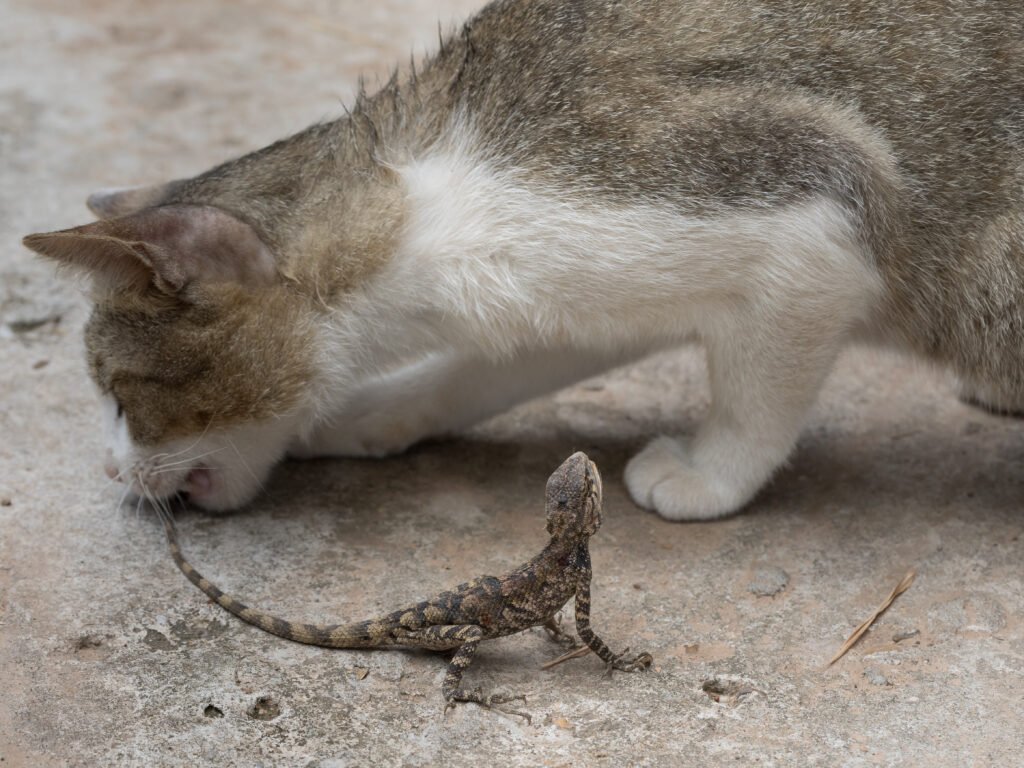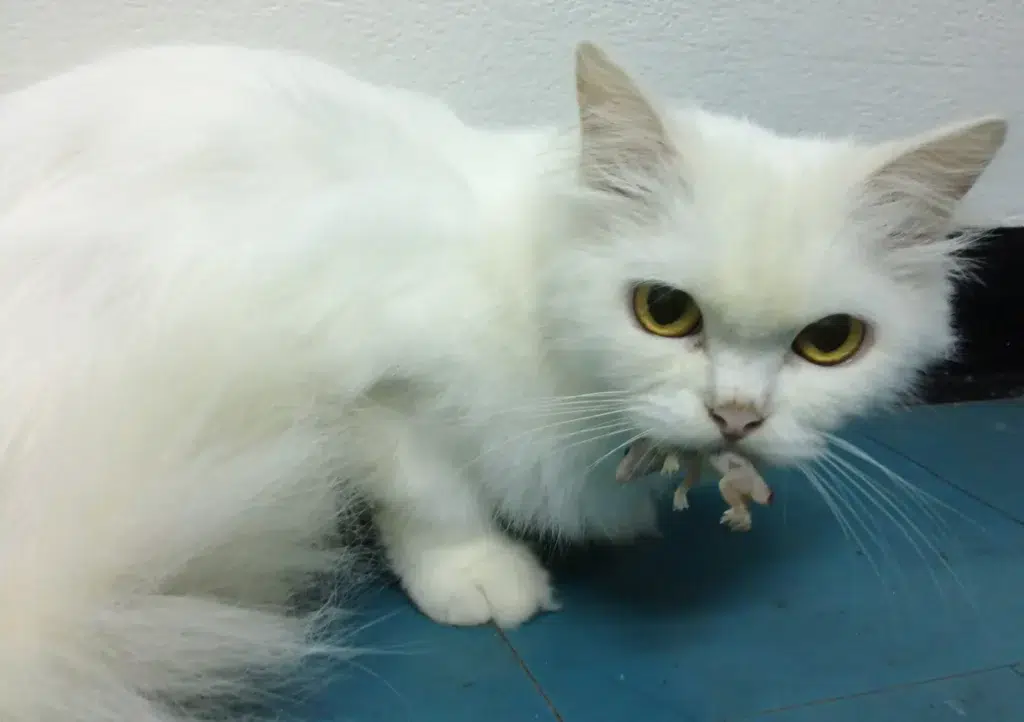Cats are natural hunters, often bringing home all sorts of unexpected “gifts,” including lizards. While this may seem like a harmless display of their predatory instincts, it raises important questions for pet owners: Do cats eat lizards? Is it safe? And what should you do if your cat happens to consume one? This article will explore these questions, offering practical advice and insights into the potential risks and necessary actions.
Do Cats Eat Lizards? Understanding Feline Hunting Behavior
Cats are instinctive hunters, driven by their natural predatory behavior. Lizards being small and quick moving are particularly enticing prey for cats. Even well-fed domestic cats can’t resist the urge to stalk and pounce on these small creatures. So, do cats eat lizards? Yes, they do. This behavior is part of their natural instincts, and many cats will not only catch but also consume lizards.
However, while it may seem like a typical part of being a cat, this behavior can sometimes lead to complications. Cats eat lizards not just out of hunger but also as a way to satisfy their hunting instincts. The question then arises: is this safe for your feline friend?
Is It Safe? What Happens If a Cat Eats a Lizard
When a cat eats lizards, the potential risks can vary depending on several factors, including the type of lizard and the region you live in. What should you expect if a cat consumes a lizard? In many cases, cats may consume a lizard without any immediate or obvious effects. However, there are risks that cat owners need to be aware of.

- Toxicity: Some lizards are toxic to cats. For instance, certain species like the Gila monster are venomous, and while they are rare, even non-venomous lizards can sometimes carry toxins that might cause harm to your cat.
- Parasites: Lizards can be carriers of parasites, including liver flukes and other intestinal parasites, which can be transmitted to your cat upon ingestion. These parasites can cause digestive issues, vomiting, and diarrhea in cats.
- Choking Hazard: Smaller lizards can sometimes pose a choking risk, especially if your cat tries to swallow them whole.
- Internal Injury: Lizards have tough skin and bony structures that could potentially cause internal injuries to a cat, particularly in their digestive tract.
Given these risks, it’s crucial to monitor your cat closely if you suspect they’ve eaten a lizard. So, what happens if a cat eats a lizard? It might be nothing, but it could also lead to serious health issues.
Steps to Take If Your Cat Eats a Lizard
If you find that my cat ate a house lizard tail or an entire lizard, don’t panic. Here’s a step by step guide on what to do:
- Check for Immediate Symptoms: Observe your cat for any immediate signs of distress, such as coughing, choking, vomiting, or signs of pain. If you observe any unusual symptoms, reach out to your veterinarian right away.
- Contact Your Veterinarian: Even if your cat seems fine, it’s a good idea to consult your vet. They might recommend bringing your cat in for a check-up to rule out any potential internal injuries or infections.
- Monitor for Delayed Symptoms: Sometimes, symptoms of parasitic infections or internal injuries may not appear right away. Keep an eye on your cat for the next few days, watching for signs like vomiting, diarrhea, lethargy, or a lack of appetite.
- Prevent Future Incidents: If my cat eats lizards frequently, consider taking steps to reduce their access to these creatures. Keeping your cat indoors or supervising outdoor time can help limit these encounters.

Preventing Cats from Eating Lizards
Preventing your cat from catching and eating lizards can be challenging, especially if they spend time outdoors. However, there are steps you can take to reduce the risk:
- Limit Outdoor Time: One of the most effective ways to prevent your cat from eating lizards is to keep them indoors. If your cat enjoys outdoor time, consider using a leash or building a catio (a secure outdoor enclosure) where they can enjoy the outdoors safely.
- Provide Alternative Stimulation: Cats need outlets for their hunting instincts. Providing plenty of interactive toys, puzzle feeders, and playtime can help satisfy their need to hunt without putting them at risk.
- Secure Your Home and Yard: If you live in an area where lizards are common, consider taking measures to make your yard less attractive to them. This could include removing debris where lizards might hide or using natural repellents.
- Regular Health Check-ups: Ensure your cat has regular vet check-ups. This is particularly important if your cat has a history of eating lizards, as your vet can screen for parasites and other potential issues.
By taking these steps, you can help ensure your cat’s safety and well-being while also protecting local wildlife.
Does It Vary by Cat? Understanding Individual Cat Behavior
Not all cats will react the same way to lizards. While some cats are avid hunters, others may show little interest in these small animals like Lizard, Mice and Spider etc.. This variation often depends on factors such as age, breed, and individual personality.
For example, younger cats or certain breeds like the Siamese may be more inclined to chase and consume lizards due to their higher energy levels and curiosity. On the other hand, older cats or those with a more laid-back temperament might be less interested in hunting.
If you find that my cat eats lizards regularly, it might be a sign of a particularly strong hunting instinct. In such cases, it’s even more important to take preventive measures to protect both your cat and the local lizard population.
Conclusion
In conclusion, while it’s natural for cats to eat lizards, it’s not always safe. Understanding the potential risks and knowing what to do if a cat eats a lizard are crucial steps in ensuring your pet’s health and safety. By taking preventive measures and monitoring your cat closely, you can help minimize the risks and keep your feline friend happy and healthy. Remember, if you ever find yourself in a situation where my cat ate a house lizard tail or an entire lizard, don’t hesitate to reach out to your veterinarian for advice. And also find more useful content about pet cares om Cooper Pet Cares.